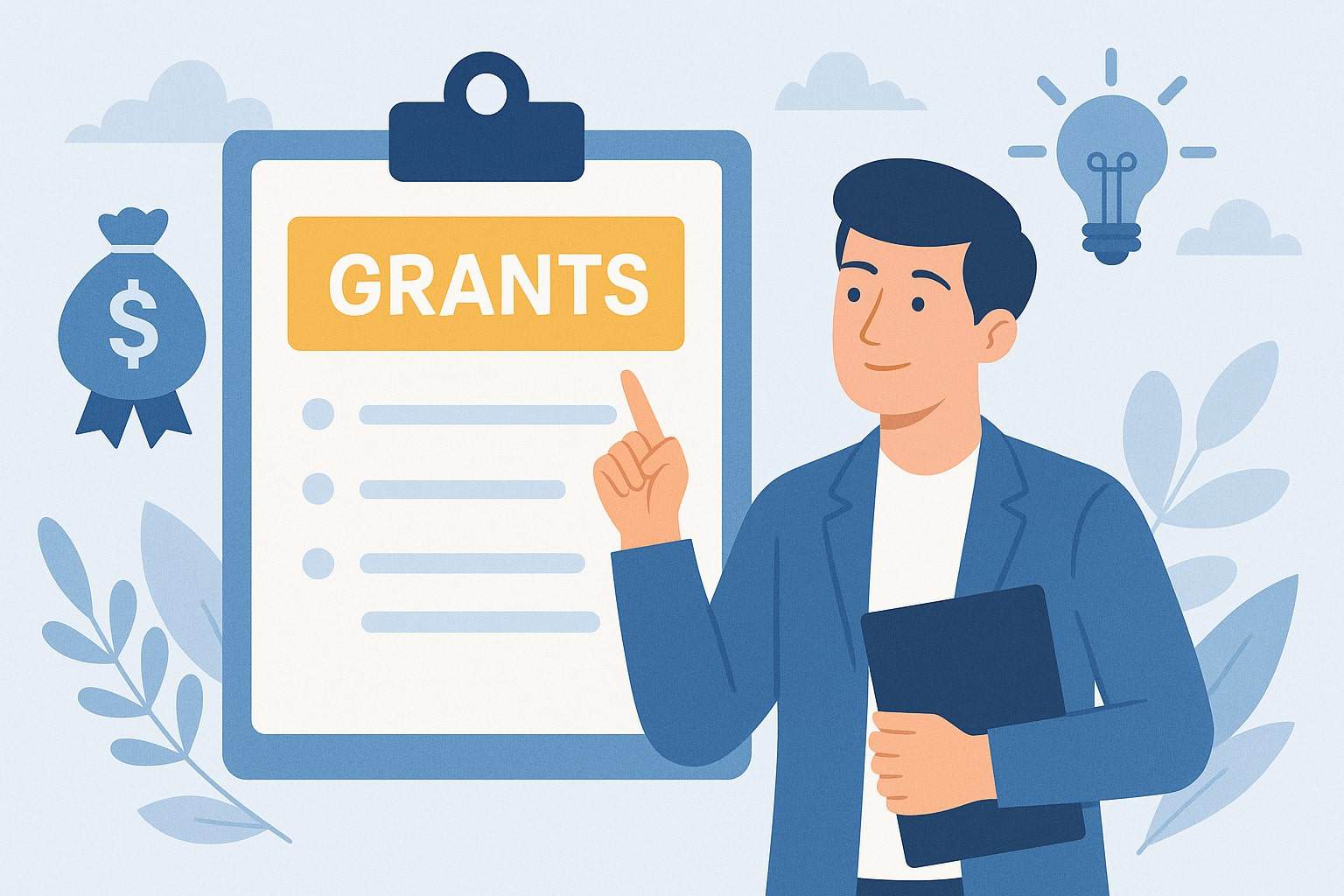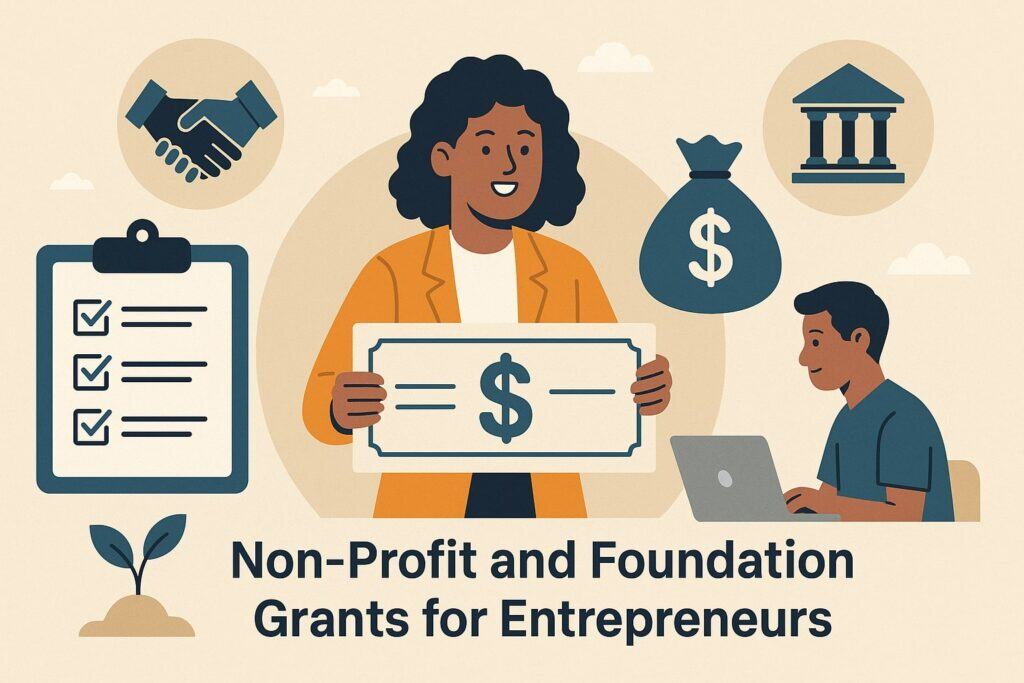
Startup Grants and Programs Every Entrepreneur Should Know
Starting a business is exciting, but it often requires substantial funding. Fortunately, entrepreneurs in the United States have access to a wide range of startup grants and programs to help turn their ideas into reality.
Unlike loans or investments, grants offer funding that usually does not need to be repaid, though they often involve detailed applications and oversight of how funds are used. In most cases, grant money is even considered taxable business income, so founders should be prepared for reporting requirements.
This comprehensive guide will walk you through the key government programs, private and non-profit funding sources, and other initiatives that cover virtually all industries. By understanding these opportunities, every entrepreneur can identify resources that fit their business needs and secure that crucial “free money” to fuel growth.
Government Grants and Programs for Startups in the U.S.

The U.S. government offers some of the most significant startup grant programs, ranging from federal research grants to state-level incentives. These public programs aim to spur innovation, economic development, and job creation.
While government grants can provide substantial funding, be aware that the application processes are competitive and often require careful documentation. Here are some major government-funded opportunities every entrepreneur should know:
- Small Business Innovation Research (SBIR) & Small Business Technology Transfer (STTR): These twin federal programs (together known as America’s Seed Fund) provide non-dilutive, equity-free funding to innovative startups focused on research and development.
Eleven federal agencies participate – from the National Science Foundation to the Department of Defense – offering grants that can reach over $1 million across phases, and up to about $2 million for promising projects.
SBIR awards require the small business to carry out R&D that meets agency needs, while STTR awards require a partnership with a nonprofit research institution. These programs have fostered breakthroughs in technology, health, and energy by funding early-stage companies to develop high-impact innovations. - Grants.gov – Federal Grant Database: Most federal grant opportunities are listed on Grants.gov, the government’s comprehensive grants portal. Entrepreneurs can search by industry, agency, or keywords to find grants that match their business.
Whether you run a tech startup or a farming cooperative, this database is the starting point to discover current federal funding opportunities. Always verify eligibility on the listing – some grants target nonprofits or universities, while others are open to for-profit small businesses. - U.S. Department of Agriculture (USDA) Grants: If your startup involves agriculture, food, or rural development, the USDA offers programs to boost rural businesses.
For example, Rural Business Development Grants support projects that benefit rural communities – funds can be used for training, land acquisition, marketing, and more to stimulate economic growth.
The USDA’s Rural Development division also provides loans, grants, and loan guarantees to encourage business expansion and job creation in towns with populations under 50,000.
These grants can be lifelines for rural entrepreneurs looking to modernize farms, start agribusinesses, or revitalize small towns. - State and Local Government Programs: Don’t overlook opportunities from your state, county, or city. Many state governments run grant or loan programs to attract new companies or support certain industries.
For instance, Texas operates the Texas Enterprise Fund (TEF), which offers “deal-closing” grants to companies that choose to open or expand operations in Texas over other locations.
These performance-based grants (sometimes large six- or seven-figure sums) require commitments like creating a certain number of jobs. Other states have grants for businesses in specific sectors (like clean energy or child care) or for entrepreneurs from underrepresented groups.
Always check with your state’s economic development agency and local small business development centers – they can point you to grants or tax incentive programs in your area. - Export and Trade Expansion Grants: The federal State Trade Expansion Program (STEP) helps small businesses enter international markets. The SBA funds STEP grants which are administered by state agencies.
If your startup wants to start exporting products or services, you can apply through your state for STEP financial assistance.
Funds can cover activities like attending foreign trade shows, translating websites for global customers, or designing international marketing materials. This program is a valuable resource to help U.S. startups go global.
Keep in mind that obtaining government grants requires patience and compliance. Applications can be time-consuming and technical, with strict eligibility rules and reporting obligations.
As one guide noted, accepting “free money” from the government comes with significant paperwork and ongoing audits to ensure you spend the funds appropriately. However, if you qualify, these programs can inject major capital into your startup and lend credibility by associating you with reputable federal initiatives.
Private and Corporate Startup Grant Programs

Beyond government aid, private companies and corporations also sponsor grant programs and contests to support entrepreneurs. These opportunities often serve as marketing or community outreach for the sponsor, but they provide real funding (usually equity-free) to the winners.
Corporate grants can cover all industries – from tech to Main Street small businesses – and are typically open to for-profit businesses. Here are some high-profile private programs every entrepreneur should know:
- FedEx Small Business Grant Contest: Shipping giant FedEx hosts an annual nationwide contest for small businesses. Launched in 2012, it awards 10 grants each year, including a grand prize of about $50,000 and several $20,000 prizes for runners-up.
In addition to cash, winners often receive FedEx print and business services. To apply, you’ll need to have a solid business story and often a video submission, and you must have a FedEx account for your business. This contest is highly competitive – thousands apply – but it’s one of the biggest corporate grant prizes around. - American Express “Backing Small” Grant Program: Financial services company American Express, in partnership with Main Street America, offers Backing Small Businesses grants to support local shops and entrepreneurs.
Typically, winners receive $10,000 grants (and certain applicants can even get up to $30,000 for specific projects). Eligibility often requires being a small business in an historic or economically vulnerable community, with under 20 employees.
Applications usually open in the spring, and there may be limits on how many applications are accepted, so timing is key. - Intuit QuickBooks + Mailchimp Small Business Heroes: This is a quarterly grant program by Intuit (maker of QuickBooks accounting software and Mailchimp marketing platform) that recognizes resilient small business owners.
Each quarter, three entrepreneurs are selected to receive $20,000 grants plus business resources. Nominations can be submitted by anyone, highlighting how a business owner has shown courage and integrity in overcoming challenges.
It’s a great example of a private initiative aimed at uplifting and inspiring small businesses across industries. - Lenovo Evolve Small Initiative: Technology company Lenovo created the Evolve Small program to help businesses with digital transformation. In recent years, winners have received a package including a $25,000 cash grant and $10,000 worth of AI technology and services.
Lenovo also provides mentorship through partners (like nonprofit Goodie Nation) to grant recipients. Eligibility has generally been for small businesses under a certain size (e.g. under 75 employees and certain revenue) in North America.
This program shows how corporate grants can also include in-kind support that helps startups modernize. - Comcast RISE: Media and telecom company Comcast launched RISE to support small businesses, especially those owned by women and people of color.
RISE has provided consulting services, technology makeovers, media promotions, and sometimes cash grants of around $5,000 to thousands of businesses.
Each year’s offerings may vary – for example, one year Comcast gave grant money in select cities, another year it focused on marketing and tech support.
Even when direct funding isn’t offered, programs like this can deliver valuable resources (advertising, technology upgrades) that would otherwise cost a startup money.
Corporate grant contests usually have well-publicized application windows and specific criteria, so it’s important to stay informed through the company’s website or newsletters.
Winning often brings more than money – you get publicity, credibility, and sometimes access to expert advice or networks. However, competition is stiff. To improve your chances, make sure to clearly convey your business’s story, community impact, and how you’d use the funds.
These corporate programs span all industries: whether you run a fashion boutique, a food truck, or a fintech startup, there may be a company offering grant contests in your field (for example, Visa’s Everywhere Initiative for payment tech startups, or breweries sponsoring food entrepreneur grants). Keep an eye out for industry-specific competitions in your domain.
Non-Profit and Foundation Grants for Entrepreneurs

A number of non-profit organizations and foundations offer grants to support entrepreneurship, often focusing on particular demographics or causes.
These grants are typically philanthropic – designed to uplift certain groups (like women, minorities, veterans) or to advance a social mission (such as community development or innovation in education). Here are some notable non-profit and foundation grant programs to know:
- Amber Grant (WomensNet): The Amber Grant Foundation, run by WomensNet, has been awarding grants to women-owned businesses since 1998. Each month, they give a $10,000 grant to a female entrepreneur with a compelling idea or story.
At year’s end, one of the monthly winners is chosen for an additional $25,000 grand prize. Uniquely, with a single application, you’re considered for all Amber grant opportunities throughout the year – including special category grants (like for specific industries) and the annual awards.
Any business that is at least 50% woman-owned is eligible, including early-stage startups, which makes this a crucial funding source for women entrepreneurs. - National Association for the Self-Employed (NASE) Growth Grants: NASE is a nonprofit membership organization that offers micro-grants to its members.
If you join NASE (typically small annual fee), you become eligible to apply for their Growth Grants of up to $4,000 each quarter. These grants can be used for a variety of business needs like marketing, hiring, or equipment.
Applications require a business plan snippet and explanation of how funds will help your business grow. While $4,000 may seem modest, it can be a great boost for home-based businesses, solo entrepreneurs, or new ventures needing a specific purchase. - Awesome Foundation Grants: The Awesome Foundation is a unique philanthropy where autonomous chapters across the world give out $1,000 micro-grants every month to support “awesome” ideas.
Many funded projects are community initiatives or creative endeavors, but startups and small businesses have been among the recipients of these grants. The application is usually a simple online form, and every month each chapter’s trustees select a project to fund – no strings attached.
If your startup has a creative project or socially impactful idea, applying to an Awesome Foundation chapter in your area can be a quick way to snag $1,000 and some local recognition. - IFundWomen Grants (Universal Application): IFundWomen is a crowdfunding platform for women entrepreneurs that also partners with corporations and foundations to distribute grants.
Through their Universal Grant Application, women-owned businesses can get matched to opportunities from partner organizations (like Visa, Comcast, American Express, etc.). Over $170 million in grants have been deployed via IFundWomen partnerships so far.
Essentially, by filling out one application about your business, you become eligible for multiple grant pools that align with your profile. This dramatically simplifies the search process for women founders seeking grants, and it’s a key resource to register with if you qualify. - Grants for Minority Entrepreneurs: There are numerous programs aimed at supporting entrepreneurs of color and other underrepresented groups.
For example, the Minority Business Development Agency (MBDA), a federal agency, periodically runs grant competitions and provides business centers to assist minority-owned businesses.
On the private side, the Fearless Fund is a venture fund that has also run grant contests for women of color entrepreneurs (though primarily it makes equity investments).
Additionally, corporate initiatives like the Fifteen Percent Pledge’s Grant Program (launched by a fashion brand to support Black-owned businesses in retail) offer grants plus mentorship to minority founders.
Minority entrepreneurs should also look to community development financial institutions (CDFIs) and local nonprofits, which sometimes have small grant programs or low-interest loans to encourage minority business growth.
Non-profit and foundation grants are often less publicized than big corporate contests, so networking and research are key to finding them. Check with local business incubators, community foundations, and industry associations – many offer grants or know of funding for specific groups (such as veterans, immigrants, or business owners with disabilities).
Although these grants might be smaller in dollar amount, they can be easier to apply for and win, since they target a narrower pool of applicants. Plus, receiving support from a respected non-profit or foundation can open doors to mentorship and further fundraising.
Startup Accelerators and Incubator Programs
Not all startup funding comes as a traditional grant – accelerators and incubators are programs that provide funding alongside mentorship, training, and networking opportunities.
Every entrepreneur should be aware of these programs, as they can rapidly accelerate a startup’s growth. While accelerators often require giving up a small equity stake rather than being completely free money, they are still a critical funding avenue to consider. Importantly, there are accelerators for almost every industry and region in the U.S.
- Equity-Based Accelerators: Prominent accelerators like Y Combinator (YC) and Techstars invest capital in startups in exchange for equity and enrollment in an intense bootcamp-style program.
For example, Y Combinator (based in Silicon Valley) provides seed funding (recently around $500,000 total in safe investments) to selected startups, who then go through a 3-month program and get to pitch to top investors on Demo Day.
Techstars runs cohorts in cities across the U.S., typically offering around $20,000 upfront plus a follow-on optional note (around $100,000) for a ~6%–9% equity stake, along with mentorship from industry experts.
These accelerators focus heavily on tech and high-growth companies. The benefit is not just the money, but access to a vast network of alumni, investors, and advisors who can help scale your startup rapidly. Acceptance rates are low, but if you get in, it can be transformative for your business. - Non-Dilutive and Niche Accelerators: Some accelerators operate on a no-equity model, granting cash prizes or stipends to startups at the end of the program instead of investing upfront.
A prime example is MassChallenge, which runs zero-equity accelerators in several cities and awards top startups with cash prizes (funded by sponsors) at the end – often totaling hundreds of thousands of dollars split among winners.
For instance, MassChallenge Boston has awarded over $1.5 million in equity-free cash to winners in a cohort. There are also niche accelerators focused on specific industries or founder groups.
500 Global (formerly 500 Startups) runs a flagship accelerator that provides $150,000 for a 6% stake to early-stage companies in any sector, alongside four months of training in Silicon Valley. On the other hand, programs like Founder Institute or university accelerators might not give much capital but offer education and connections in particular locales or fields.
Industry-focused accelerators (for example, healthcare accelerators, clean energy labs, or food business incubators) often provide tailored support and sometimes grants or stipends funded by government or corporate sponsors. - Startup Competitions and Challenges: Many organizations host competitions that function like short-term programs, where startups pitch ideas to win prize money.
The Visa Everywhere Initiative, for example, is an annual global competition for fintech and payment startups, awarding winners up to $100,000 (and often regional prizes) along with the prestige of partnering with a big brand.
Similarly, Challenge.gov is a platform listing various innovation contests run by government agencies, where solving a specific problem (in areas like health, education, or technology) can earn your startup a sizable cash prize.
Even universities and industry conferences run pitch competitions that offer grants or equity-free awards to winners. These contests are excellent opportunities to both raise funding and get exposure – even if you don’t win the top prize, you might attract investor interest or gain feedback to improve your business.
Accelerators and competitions require a significant commitment of time and effort, and the selection processes are rigorous. However, for many entrepreneurs, the combination of capital, mentorship, and networking is well worth it.
Graduating from a respected program can validate your startup in the eyes of investors and customers. As you consider these programs, research what each offers (cash amount, mentorship, industry focus, duration) and what they expect in return (equity, relocation for a few months, etc.).
Whether you join an accelerator or compete in a pitch challenge, these programs can be catalysts for startup growth that every founder should keep on their radar.
Frequently Asked Questions (FAQs)
Q: What is a startup grant and how is it different from a loan or investment?
A: A startup grant is a sum of money given to a business that does not need to be repaid, unlike a loan. Grants are typically provided by governments, non-profits, or corporations to support specific goals (such as innovation, community development, or empowering underrepresented founders).
They often require an application describing how the funds will be used, and you must meet certain criteria. Unlike an investor’s money, a grant provider doesn’t take equity or ownership in your company.
Essentially, grants are free funding – but you must use the money as promised and report on the outcomes, rather than paying it back. This is different from loans (which you repay with interest) or equity investments (where you give up a share of ownership).
Q: How can I find available startup grants in the US that fit my business?
A: Start with online databases and official resources. For example, visit Grants.gov to search thousands of federal grants by category or keyword – it’s the main portal for U.S. government funding opportunities.
Also check the Small Business Administration (SBA) website; while the SBA itself offers limited grants, it often lists programs like SBIR/STTR or grants for exporting (STEP). Beyond federal sources, look locally: state commerce departments and city economic development agencies often post grant opportunities on their websites.
You can also use specialized small business grant directories or platforms like IFundWomen (for female entrepreneurs) or Hello Alice, which frequently publish current grant programs. Networking is useful too – join local business associations or online entrepreneur groups where members share grant leads.
By combining these sources, you can create a list of grants that match your startup’s industry, location, and owner profile.
Q: Do I have to pay taxes on grant money my startup receives?
A: Often yes. In the U.S., most grants to businesses are considered taxable income. Even though a grant isn’t a loan you repay, the IRS usually treats it as revenue for your company in the year it was received.
There are exceptions – for instance, certain government research grants or educational grants might be tax-exempt if used for specific purposes – but generally you should plan on the grant adding to your business’s income.
That means you may owe taxes on it unless you have offsetting expenses. It’s important to consult with an accountant or tax professional after winning a grant.
They can help ensure you set aside enough for taxes and properly record how grant funds are spent (since qualifying expenses could be written off, reducing the taxable amount). Always keep documentation of grant awards and related expenditures to make tax filing easier.
Q: What can increase my chances of winning a startup grant or getting into a funded program?
A: Preparation and alignment are key. First, make sure you meet all eligibility requirements and follow application instructions to the letter – many applications are rejected simply for being incomplete or off-target.
Tailor each application to the grant’s goals: emphasize how your business matches what the funder is looking to support (e.g. community impact, innovation in a field, job creation, etc.). A clear and compelling business plan or proposal is crucial; include data or research to back up your claims.
If it’s a pitch competition, practice your pitch and get feedback to make it concise and impactful. It also helps to start small and local if you’re new to grants. Winning a local or niche grant can build your credibility for larger grants later.
Finally, leverage any available support – many cities have Small Business Development Centers (SBDCs) or nonprofit advisors who can review your grant proposals or pitch decks. Their insights can make your application stronger. Persistence matters too: don’t be discouraged by rejection; learn from it and improve for the next opportunity.
Q: Can I apply for multiple grants and participate in several programs at the same time?
A: Generally, yes – as long as you can meet all the obligations. It’s common for entrepreneurs to apply to many grants since each is competitive. You can even accept multiple grants if awarded, provided their terms don’t conflict.
(For example, some government grants might prohibit “double-dipping” for the same expenses from two sources, but you could use two grants for different projects or cost categories.) The key is to stay organized: track deadlines, required reports, and use of funds for each source.
Participating in an accelerator program alongside a grant is also feasible; many startups do an accelerator (which might give some funding) while also receiving a government or foundation grant. In fact, having multiple funding sources can be beneficial – it shows other funders that your venture has momentum and support.
Just ensure you have the bandwidth to fulfill all requirements. If you win a grant that requires intensive reporting or a program that requires your full attention for a few months, you may need to schedule commitments so they don’t all overlap.
But in principle, there’s no rule barring you from stacking several grants and programs – it’s a smart strategy to patch together resources for your startup’s journey.
Conclusion
In today’s entrepreneurial ecosystem, startup grants and programs are crucial tools to launch and grow your business. From hefty federal grants that drive high-tech innovation to small community grants that help a local shop get off the ground, there’s likely a program that fits your needs.
The U.S. offers an abundance of these opportunities across all industries and demographics – the key is knowing where to look and how to qualify. Use resources like Grants.gov for federal funding searches, and tap into local networks (SBDCs, economic development offices, online grant databases) to find private and non-profit programs.
Remember that grants and funded programs, while attractive as “free” money, come with their own costs in effort. You’ll need to invest time in writing strong applications, crafting business plans and proposals, and gathering documentation like financial records.
If awarded, you must use the funds as intended and often report on your progress or results to the grantor. It’s wise to apply for multiple opportunities to improve your odds – you may qualify for more than one program simultaneously. Also, be mindful of deadlines and specific criteria; a missed date or minor eligibility detail can derail an application.
The landscape of startup funding is always evolving. New corporate contests, foundation initiatives, or government programs can emerge in response to economic shifts or societal needs.
Stay informed by subscribing to entrepreneur newsletters or grant alert services, and don’t hesitate to ask mentors or peers about programs they’ve benefited from. With persistence and awareness, you can tap into these grants and programs to give your startup a financial boost and a stamp of credibility.
In sum, whether you’re building a tech startup, a social enterprise, or a neighborhood business, there is support out there. Take advantage of these resources to accelerate your entrepreneurial journey, and combine them with your own creativity and hard work for the best chance of success.